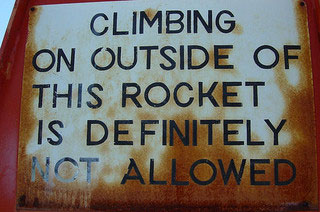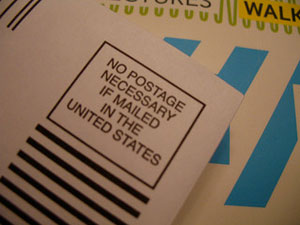
Source: Definately not allowed, Nick & Kirsten, Flickr
According to a BBC report on British television, a third of the 2,000 people polled could not spell “definitely.“ Two-thirds couldn’t spell “necessary.” Just how good a speller are you?
Before you start this section, take the spelling quiz below to gauge your spelling ability and fluency. How fast can you spell correctly? When you finish, compare your score with other teens.
Whether you are in the top echelon of spellers or at the bottom, speller-checkers are “definitely necessary.” The amazing thing is some people still don’t use them. According to the same BBC report, when asked how often they rely on spell-check, nine percent of the people polled said they never use it.

Source: Return to Sender, John, Flickr
If you’re someone who ignores the red squiggly lines under words, think seriously about changing that bad habit before you go to high school. Running the spell-checker is one of the first steps to follow when you are editing your written work.
Spell-checkers will visually alert you when you put an “e” in judgment or in the last syllable of calendar. Spell-checkers will tell you to double only the “c” in occasion and to double both the “c” and “m” in accommodate. Spell-checkers will also add a red squiggly line if you forget the “n” in government. As good as they are, though, spell-checkers will skip over some misspelled words. Read the following adapted letter to the editor, “Recalling a Spelling Bee,” from the New York Times. Our spell-checker missed several errors.
Reading “Spelling Out the End,” by Tania James (Op-Ed, May 29), I recalled my own unhappy experience. Years ago I represented my Chicago school in a spelling be in witch I didn’t want to participate. I thought my student coach, a better speller than I, should have been chosen.
Although eye was an excellent student and competitive, I saw know importance in knowing how to spell words I didn’t use. At the bee I mist my very first word, an easy won that I new: allegiance. I said, “a-l-e,” and there was no going back.
As soon as I finished, too of my friends and I ran out of the auditorium, leaving a very unhappy teacher. I don’t no why I spelled it wrong—rebellion or nervousness? I was just relieved and absolutely happy to never have to do that again.
I became a teacher and an editor and always use a dictionary when in doubt.
DOROTHY STEARN
New York, May 29, 2012
 None of the words in red were flagged by the spell-checker. Using your notes, write what you think these words have in common. When you are finished, check your understanding to see a possible response.
None of the words in red were flagged by the spell-checker. Using your notes, write what you think these words have in common. When you are finished, check your understanding to see a possible response. Sample Responses:
One of the big problems with spell-checkers is that they miss homophones. Typos like “except an invitation,” “crawl threw the window,” or “increased the company’s sails” may make it into a final document because except, threw, and sails are valid words. In other words, spell-checkers are lousy at guessing the context of words. The spell-checker compares words against a database of correctly spelled words without checking the context.
 Now, using the context—the text surrounding the words in red—figure out the correct homophone for each word in the letter above. Use your notes again to write your responses. When you are finished, check your understanding to see the answers.
Now, using the context—the text surrounding the words in red—figure out the correct homophone for each word in the letter above. Use your notes again to write your responses. When you are finished, check your understanding to see the answers. Sample Response:
Reading “Spelling Out the End,” by Tania James (Op-Ed, May 29), I recalled my own unhappy experience. Years ago I represented my Chicago school in a spelling bee in which I didn’t want to participate. I thought my student coach, a better speller than I, should have been chosen.
Although I was an excellent student and competitive, I saw no importance in knowing how to spell words I didn’t use. At the bee I missed my very first word, an easy one that I knew: allegiance. I said, “a-l-e,” and there was no going back.
As soon as I finished, two of my friends and I ran out of the auditorium, leaving a very unhappy teacher. I don’t know why I spelled it wrong—rebellion or nervousness? I was just relieved and absolutely happy to never have to do that again.
I became a teacher and an editor and always use a dictionary when in doubt.
DOROTHY STEARN
New York, May 29, 2012
While spell-checkers are a great first step, you have learned that you can’t depend on them exclusively. They can be useful tools, but they are far from foolproof. If you need to improve your ability to recognize homophones such as scent or sent, rite or right, or eminent or imminent, play this Merriam Webster game for extra practice.